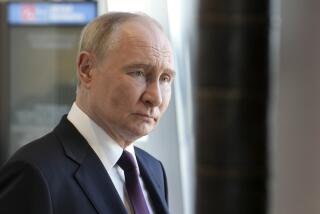Gorbachev Tours West German Center of High-Tech Industry
- Share via
STUTTGART, West Germany — Soviet President Mikhail S. Gorbachev visited this high-tech city in southern West Germany on Wednesday and watched, smiling, as one robot poured a glass of local wine and another served it to him.
A couple of the high-tech machines on display at Stuttgart University failed to work properly, but Gorbachev took it all in good humor.
He was in a congenial mood, established on arrival at the New Castle, which was built in the 18th Century, destroyed by bombs in World War II and rebuilt in 1958. It stands in the center of Stuttgart, the capital of the state of Baden-Wuerttemberg and the home of car makers Mercedes-Benz and Porsche.
Thousands of people crowded into Castle Square for his noon-time arrival, chanting “Gorby! Gorby!” He obliged the throng by springing from his black Zil limousine and pumping hands along the restraining barrier. He signed his book “Perestroika” for one greeter who thrust it out to him.
Later, at a meeting with state Premier Lothar Spaeth, the Soviet president said that the warmth of the West German crowds indicated to him that “this is more than feelings; this is evidence of the great changes that have taken place.”
Spaeth is one of the most popular politicians in West Germany, a member of Chancellor Helmut Kohl’s Christian Democratic Union. He has been mentioned in the West German press as a possible successor to Kohl.
On Tuesday, Gorbachev had met with Hans-Jochen Vogel, leader of the opposition Social Democratic Party, who is also regarded as a possible candidate for chancellor.
Gorbachev praised Spaeth, noting that “the people of your state have been out in front” in pioneering joint economic ventures with the Soviet Union.
He told a group of businessmen who attended a reception given by Spaeth that “I think if we depend on each other in the economic sphere it is good, because then politics become more reliable.”
Spaeth in turn praised Gorbachev for his idea of a “common European home,” but he pointed out that Germany continues to be divided by barbed wire and the Berlin Wall.
“The building site for the European house is not yet finished,” Spaeth said. “There are still barbed wire and walls. But despite this we must begin.”
Gorbachev, accompanied by his wife, Raisa, also was greeted by an enthusiastic crowd of students at the university, which specializes in technology. A physics student, Karsten Maier, 26, said Gorbachev is more popular at the university than President Bush because Gorbachev “represents new ideas, a revolution in the system.”
“It’s not that we dislike Bush,” Maier said, “but there is no change in the American system, and Gorbachev represents change, and this is more exciting.”
Gorbachev was shown a number of high-tech exhibits, among them a high-speed knitting machine that failed to perform as advertised. Then he watched as an “omni-directional and automated guided vehicle” took a tray with two glasses of wine from a robot pourer, then wheeled around and delivered it to him. He took a sip of the wine and smiled.
In Bonn, meanwhile, West German and Soviet officials issued a joint statement declaring that West German firms will help to modernize Soviet light industry, particularly in the food sector, by setting up joint ventures to supply equipment.
Gorbachev’s German publisher, Peter Schaper of Droemer Knaur Verlag, reported in Saarbruecken that “Perestroika” had already earned the author about $155 million in royalties.
Schaper said the book has sold 800,000 copies in West Germany since it was brought out in 1987 and is currently No. 7 on the best-seller list. He said he estimates that about 10 million copies of the book have been sold worldwide.
Gorbachev has said that the royalties will be shared by the Communist Party and relief and welfare organizations in the Soviet Union.
More to Read
Sign up for Essential California
The most important California stories and recommendations in your inbox every morning.
You may occasionally receive promotional content from the Los Angeles Times.













